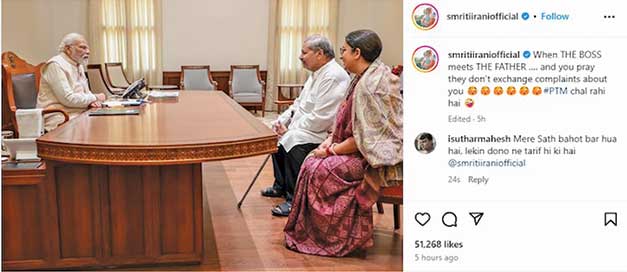Anuradha C
Union Minister Smriti Irani posted this cheeky but endearing social media quip a few weeks back. By likening her father’s meeting with Prime Minister Modi to a dreaded parent-teacher meeting, she managed to win the hearts (and sympathies) of millions of students!

Why is the PTM such a dreaded event for students?
In a young student’s life, he/she inhabits two universes in parallel. One is the hyper-expectation, hyper-care, hyper-attention filled home environment. The other is the impersonal, collective learning environment of a school where it’s easy to get lost in the crowd. We aren’t talking about the kids with a super-duper academic record here, but the average, non-descript backbencher.
At the rare times when these two universes collide, there is a great fear of the unknown and unpredictable. Good students are waiting to hear sweet words of praise from their teachers. Average students are desperately hoping teachers don’t say anything dangerous to their existential peace at home. The utterly hopeless students are best trying to avoid these two universes from meeting – fake illness, fake official trip, fake anything to prevent the dreaded meet!
The parent and the teacher are the two major influencers of a child’s path. They get to make all the decisions in the young one’s life. So the underlying reason for the feeling of dread is – what if these people mutually discover/decide something for me that I don’t like? The child is not convinced that the meeting is happening to safeguard its own interest in the long run. This is where we adults are failing – defining and communicating the purpose of the meet to the child.
What fair (and unfair) expectations do parents have from a PTM?
In the ancient days, imparting education was considered the highest form of charity or giving – “vidya daana maha daana”. So the teacher or teaching institution was revered and their contribution to the students’ well-being was considered sacred by the parents. Teachers too reciprocated the parents’ trust; they took complete responsibility for the child’s knowledge development and well-being. This was especially possible because there was no monetary aspect involved.
However, in today’s academic setup, parents are often paying a bomb to get their kids educated in prestigious schools. As a consequence, the parents tend to behave like customers purchasing an expensive service from the education institution. Gone is the reverence, it’s more about getting your money’s worth.
It is in this context that a PTM often turns into a client-customer interaction session where the teacher has to hard sell what they delivered for the payment received. The parent may not be open to feedback or taking corrective measures at home which might benefit the child. Both parties find it convenient to find fault with the student when things aren’t proceeding as expected in the academic year.
How can teachers prepare for making PTMs a constructive forum?
All that the teacher really needs to devote to a student is exclusive, quality time. So that they can assess the individual caliber and interest of the student at close quarters. Oftentimes, this is an unfair expectation given the pathetic student-teacher ratios in many of our schools.
Teachers would do well to maintain short academic chronicles of their students. They could take a few minutes at the end of each day to note any special, abnormal occurrences among the students. Since teachers get to meet parents only occasionally, only recent experiences are often shared, as the older memories fade away. Teachers could use the chronicles recorded to share such critical events with parents. And the parent would also deeply appreciate the individual care and attention that the teacher is paying.
Young children can be likened to tender saplings eager to grow but needing support. The goal is to cultivate a garden – beautifully curated and well cared for. Without individual care and careful weeding, all that we will manage to grow is a wild forest. The home owner has entrusted his precious plants to the expert gardener. It’s up to the gardener now.
The author is an IT industry drop-out after several years of slogging and money-making. She is now working freelance as a corporate technical trainer and content writer. She is hoping to channelize her passion for writing into a satisfying experience for herself and a joyous experience for her readers. She can be reached at anuradhac@gmail.com.
